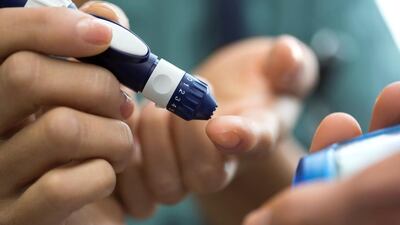The UAE is lagging behind the rest of the world in its diabetes care, despite having the highest rates of internationally accredited hospitals in the world, according to a UN-backed report.
Figures are published in a comprehensive dossier on the state of the nation conducted by the UAE University Center for Public Policy and Leadership, in collaboration with the United Nations Development Programme.
The UAE has some of the highest rates of diabetes in the world, with 2015 figures showing 19.3 per cent of the population have the condition, positioning it 13th on a World Diabetes Federation list.
About 11 per cent of total global health care expenditure is spent on diabetes care, according to the report, or $465 billion a year.
The average spend on diabetic patients in the US is about $8,468 (Dh31,000), and $4,267 (Dh15,670) in the UK — but in the UAE, expenditure on diabetes care is just $1,775 (Dh6,518) per patient, according to the university report.
“Obesity and diabetes pose by far the greatest risk for the UAE and the GCC,” said Dr Shamsheer Vayalil, chairman and managing director of VPS Healthcare.
“These chronic health problems not only pose substantial problems for the patients, but also constitute a massive burden on families, communities and on the economy.
“To overcome these challenges, we need to have information-driven health care, powered by quality, actionable data that will provide insights to inform health policies and programmes for the future.
“These goals are not easy, but the sooner we move from reactionary to anticipatory care, the better the outcomes will be for our populations.”
Cases of diabetes are expected to spike in the next 27 years, and will provide serious challenges to health authorities in the region.
An estimated 39 million diabetic patients in the Eastern Mediterranean and North Africa region is forecast to soar to 67 million cases by 2045 — a 72 per cent increase.
By comparison, European countries are expected to see a rise of 16 per cent, and a worldwide increase of 48 per cent in that time.
“This large disparity in diabetes spending may reflect not only the quality of health care but also the different adequacy of policies, strategies and regulations in health expenditure,” the UAE report said.
____________________
Read more:
Dubai hospitals trial latest medical headband technology to cut stroke deaths
Dubai in a healthy place to compete for health tourists
Businesses in Ramadan: strange hours but similar problems for UAE hospitals
______________________
While diabetes care has some way to go to catch up with the west, more internationally accredited hospitals in the country indicates the nation’s ambitions to appeal to medical tourists by achieving globally recognised standards.
The number of hospitals with international accreditation increased from 16 in 2008 to 43 hospitals in 2013, according to the report that claims it is an indicator of excellence of health services.
In 2015, 87 hospitals out of 128 were accredited, of which 23 were public hospitals and 65 privately run.
“It was announced at the beginning of 2018 that the UAE ranked first in the world in the number of medical establishments and facilities with international accreditation,” the report said.
“The Ministry of Health and Prevention planned that all hospitals and centres will receive the international accreditation certificate by 2021, in line with the vision of the state.”
The work is a national document and a key reference for decision makers to help them formulating best public and national policies concerned with human development, and the first since 1997.
“In my experience, the overall health of the country has been improved as the UAE provides some of the best health care services and caters to various requirements of the population,” said Dr Yashar Ali, chief executive of Canadian Specialist Hospital.
“However, due to unhealthy lifestyle, non-communicable diseases like diabetes, cardiovascular diseases and cancer are still common in the country.
“The most common trend that leads to non-communicable diseases is smoking.”


